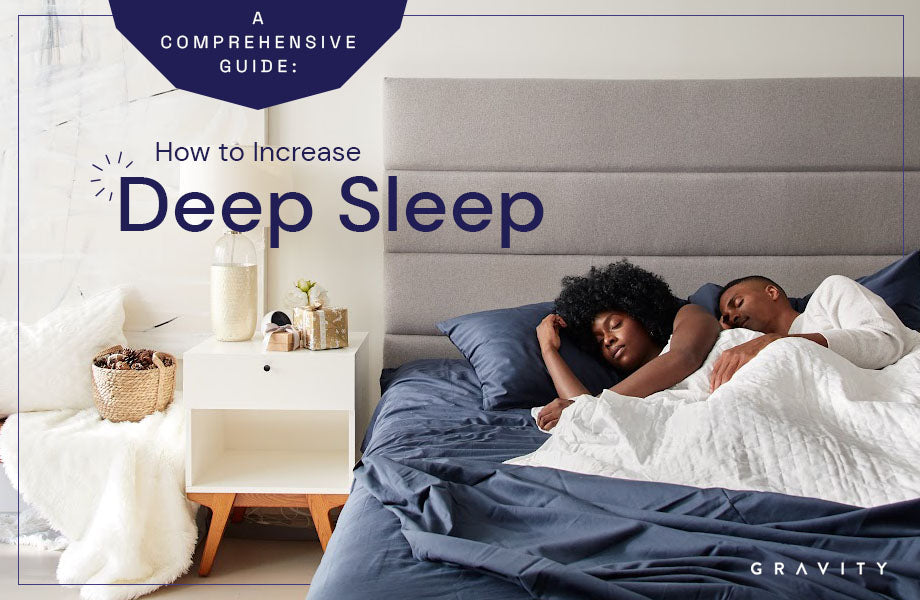
Jan 05, 2022
A Comprehensive Guide: How to Increase Deep Sleep

It's no secret that most people could stand to get more sleep. According to the CDC, one in three American adults isn’t getting the recommended amount of shut-eye they need on a regular basis. But equally important as the duration of sleep is the quality of our sleep. Our brains cycle through four different stages of sleep every night, and researchers say that the third stage — aka, deep sleep — is key to getting more high-quality snooze.
But what is deep sleep, exactly, and how do you ensure you’re getting enough? In this guide, we’ll break down the basics of deep sleep and explain how to increase deep sleep for optimal health and wellness (hint: a weighted blanket can help!).
Shop Weighted BlanketsWhat Is Deep Sleep?
So, what is deep sleep? Before we can answer that, let’s talk about the different stages of sleep.
Sleep isn't a linear process like many people assume, but rather a cyclical one. When you fall asleep at night, your brain progresses through several sleep cycles, each one lasting approximately 90 minutes. During each sleep cycle, your brain alternates between two phases of sleep: non-rapid eye movement (NREM) sleep and rapid eye movement (REM) sleep.
NREM sleep is characterized by a lack of eye movement and increased slow-wave activity and bursts of neural activity, known as spindles. This sleep phase is broken down into three sub-stages:
N1 (Stage 1). This is the shortest and lightest stage of sleep. During N1, your breathing and heart rate are regular, and your body relaxes in preparation for sleep.
N2 (Stage 2). The drowsy N1 stage is followed by the N2 stage, which facilitates a drop in body temperature and breathing rate. This phase is also marked by the presence of spindles, which are thought to play an important role in memory consolidation.
N3 (Stage 3). This stage is what people are referring to when they talk about deep sleep. Also known as slow-wave sleep and delta-wave sleep, N3 is the deepest stage of sleep and is generally associated with slow frequency, high amplitude signals called delta waves. It’s also the most difficult stage to awaken from, with many people experiencing mental fogginess and disorientation upon waking up in the middle of the N3 phase.

After your brain progresses through the stages of NREM sleep, it enters what is known as REM sleep, the final stage of sleep and the one where you dream. During REM sleep, your eyes move rapidly behind your eyelids, and your breathing and heart rate increase. Your arms and legs are also paralyzed, so you don't act out your dreams. The REM stage usually starts around 90 minutes after sleep onset, with the length of each REM stage increasing throughout the night. For instance, the first REM stage may only last a few minutes, while the final REM stage could last for an hour.
The Importance of Deep Sleep
The benefits of deep sleep go beyond waking up feeling refreshed and alert. During deep sleep, the hippocampus — the complex region of the brain associated with memory storage and learning — takes the information it accumulated throughout the day and sends it to the cerebral cortex (the part of the brain responsible for thinking and understanding). This helps reinforce the connections between neurons, making it easier for you to retrieve long-term memories.
However, improved memory and learning aren’t the only functions of deep sleep. The N3 stage of sleep is also responsible for:
- Repairing and regrowing tissues
- Building bones and muscles
- Restoring energy
- Promoting cell regeneration
- Strengthening the immune system
Additionally, some research suggests that deep sleep plays a vital role in clearing out toxic waste from your brain. Indeed, according to a new study published in PLOS, researchers suggest that brain activity during deep sleep may help flush out proteins such as amyloid-β (Aβ) and tau, which have been linked to Alzheimer’s disease.
How Much Deep Sleep Do You Need?
Although NREM sleep constitutes about 75 to 80 percent of total sleep time, experts estimate that deep sleep only accounts for about 13 to 23 percent of total sleep time in the average healthy adult. So if you normally sleep for eight hours a night, that means you need somewhere between 62 and 110 minutes of deep sleep a night.

Keep in mind that our sleep needs change as we get older. As people age, they tend to spend less time in slow, delta-wave sleep. One probable explanation for this decline in deep sleep could be that older adults often experience sleep difficulties as they age. (According to one study, up to 50 percent of older adults report difficulty falling and staying asleep.) Interestingly, research also suggests that men experience a sharper decline in deep sleep compared to women.
How Do You Know If You’re Getting Enough Deep Sleep?
Although sleep trackers are often touted for their ability to track deep sleep, these devices are often wildly inaccurate. In truth, the only real way to know how much deep sleep you’re getting is through a formal study at a sleep center. During the sleep study, researchers will use a polysomnogram to record your brain’s electrical activity as you cycle through various sleep stages.
Of course, signing up for a sleep study isn’t a practical option for everyone. Instead, you can gauge how much deep sleep you’re getting by taking stock of how you feel the next day. If you feel mentally sluggish or physically exhausted despite getting eight hours of sleep, chances are, you didn’t get enough deep sleep.
How to Increase Deep Sleep
Since the discovery of slow waves in the 1930s, scientists have been trying to figure out how to increase deep sleep. While there are some specific things you can do to spend more time in the N3 stage, most sleep experts agree that the single best way to increase the amount of deep sleep is to practice good sleep hygiene.
With that in mind, here are a few sleep hygiene tips to increase your time spent in every stage of sleep, including deep sleep:

- Create a sleep-inducing environment. Before you wind down for bed, set the thermostat to a comfortable temperature (ideally, somewhere between 60 and 67 degrees F). Block out potential noise disturbances with earplugs or ambient sounds. Finally, don’t forget to keep your bedroom as dark as possible. Wearing a weighted sleep mask to bed is an easy and effective way to relax before bed while simultaneously making your sleeping environment pitch black.
- Nix caffeine, alcohol and other sleep-interfering substances from your diet. Research has shown that taking 400 mg of caffeine — about four cups of brewed coffee — even six hours before bedtime can ruin your sleep quality. Likewise, alcohol abuse has been associated with sleep disturbances, including lower slow wave sleep in the second half of the night.
- Stick to a consistent bedtime routine. Choose a suitable bedtime that allows for seven to eight hours of shut-eye. Stick to your sleep schedule, even on the weekends. This helps stabilize your circadian rhythm, the “internal body clock” that carries out essential functions on a 24-hour cycle.
- Avoid screens before bed. Electronic devices such as your smartphone and tablet emit blue light, a form of visible light that messes with your body's melatonin production and keeps you awake. To mitigate these effects, download blue light blocking apps on your devices and limit their use in the hours leading up to bedtime.

- Find ways to relieve stress. Studies suggest that stress decreases slow wave sleep, so anything you can do to relieve stress and worry before bedtime will be beneficial for enhancing your sleep quality. When it comes to keeping worries in check, many people find weighted blankets to be helpful. These therapeutic blankets use gentle pressure to relax your body as you sleep under it, akin to being enveloped in a warm hug all night. Worried you might get too hot underneath one? Try our premium quality cooling weighted blanket for a deeper sleep.
- Go to bed only when you feel sleepy. When you repeatedly go to bed feeling wide awake, your brain starts to associate your bed not with sleep, but with wakefulness. Therefore, you should only go to bed when you’re starting to get tired. If your bedtime is approaching and you still feel wired, try winding down with a relaxing activity (e.g., reading and meditation).
- Limit napping. Napping for too long can impair your circadian rhythms, making it difficult to get quality sleep. To avoid throwing off your body’s natural wake-sleep cycle, keep your naps short or avoid them altogether.
Other Ways to Increase Deep Sleep
Besides practicing good sleep hygiene, here are a few scientifically proven ways to increase deep sleep.
1. Get Regular Exercise
Exercise is a tried-and-true way to improve sleep quality. In fact, recent research suggests that exercise can improve the quality of slow-wave sleep by increasing the stability of slow waves in early sleep phases.
Are you now wondering which exercises are best for enhancing deep sleep? According to experts, moderate-intensity aerobic exercise (think riding a bike and brisk walking) is highly effective at improving sleep quality. Additionally, strength training exercises such as lifting and bodyweight exercises (i.e., push-ups, sit-ups) can help improve many aspects of your nightly rest, including deep sleep.
2. Consider Hypnosis
Due to how hypnosis is often portrayed in pop culture, many people are quick to write off this psychological therapy process as a potential sleep solution. However, hypnotic suggestion has actually shown a lot of promise in improving sleep. In a study from the University of Zurich, researchers found that slow-wave sleep improved as much as 80 percent in female participants who were “highly suggestible” to hypnotic therapy. To get started with hypnosis, find a qualified hypnotherapist near you.

3. Listen to Music
As a baby, your parents probably sang lullabies to help you fall asleep. But did you know that relaxing music can help you achieve better quality sleep in adulthood as well? Indeed, research suggests that listening to binaural beats can help you relax and achieve deeper sleep.
Binaural beats are auditory illusions created by the brain when you hear two different sound frequencies at the same time. When you listen to binaural beats, your neurons begin to send messages to the brain at the same rate. According to some experts, this may increase the strength of certain brain waves and help you achieve a certain mental state that is more conducive to deep sleep.
4. Learn Something New
Learning new things can improve a host of cognitive functions, including concentration, problem-solving and attention to detail. And according to some researchers, spending the day learning may help you fall into a deeper, more restful sleep. In a 2002 study, German researchers found that participants who spent the day learning had a higher density of sleep spindles compared to those who spent the day doing non-learning activities. While spindles may not increase the amount of time spent in the deep sleep stage, some research suggests that they can help you stay in the deep sleep stage in the face of sleep disturbances, such as loud noises.
5. Try Aromatherapy Before Bed
Aromatherapy is another valuable sleep tool that shouldn't be overlooked. The soothing scent of certain essential oils has been scientifically proven to positively affect sleep.
Lavender is perhaps one of the most well-studied essential oils for sleep, and with good reason. Numerous studies show that lavender can induce a state of relaxation, helping the user fall and stay asleep. A recent study also found that the aroma of lavender may enhance slow-wave sleep.

Improve the Quality of Your Sleep with a Gravity Blanket
While it’s true that every stage of sleep plays an essential role in our health, deep sleep is arguably the most important stage for truly restorative sleep. Slow-wave sleep is responsible for a slew of vital functions, from muscle repair and growth to learning and memory storage.
To further enhance the quality and quantity of your sleep, try our best-selling Gravity Weighted Blanket. Backed by science and made with premium quality materials, it’s one of the easiest ways to sink into a state of relaxation and achieve deeper sleep!
Image Credits
sini4ka/Shutterstock.com
Stock-Asso/Shutterstock.com
Your use of this website, its content, and any products obtained through this website is at your own risk. This website, its content, and any products obtained through this website are provided on an “as is” basis, without any warranties of any kind, either express or implied, including warranties of merchantability, infringement of intellectual property, or fitness for any particular purposes. No warranty or representation is made with respect to the completeness, reliability, quality, or accuracy of this website or its content. This website, its content, and any products obtained through this website do not constitute medical treatment and is not a substitute for a medical examination or diagnosis. If you are dealing with a health condition check with your health care provider before using. This website may contain affiliate links that allow us to earn a commission on purchases made through such links. We may accept forms of advertising or sponsorships in connection with this website. There might also be paid topic insertions. We may accept and keep free products, services, and other forms of compensation from others.



